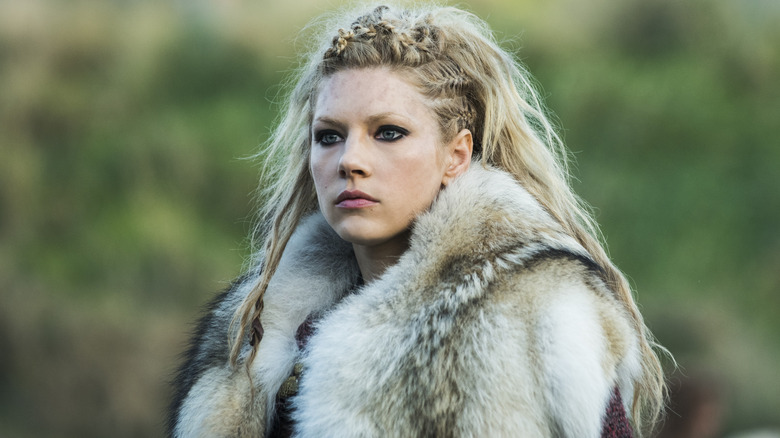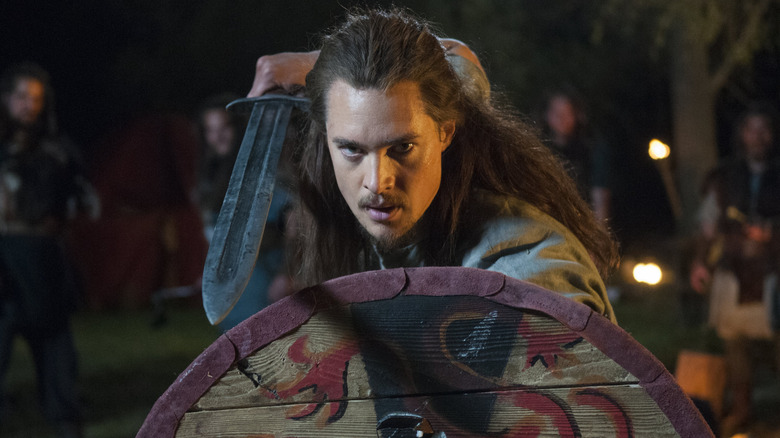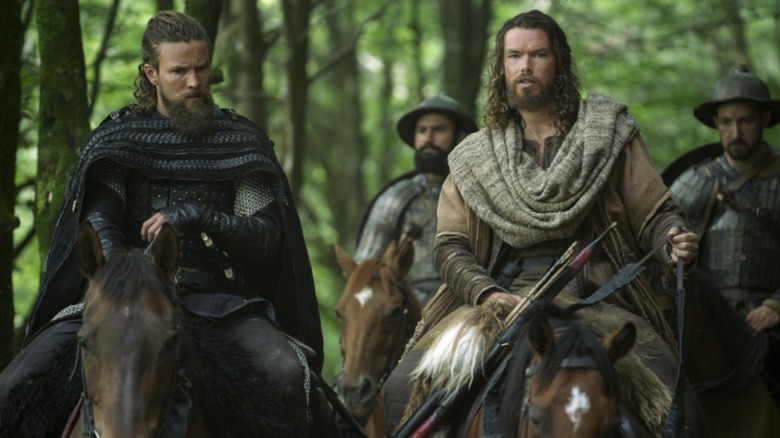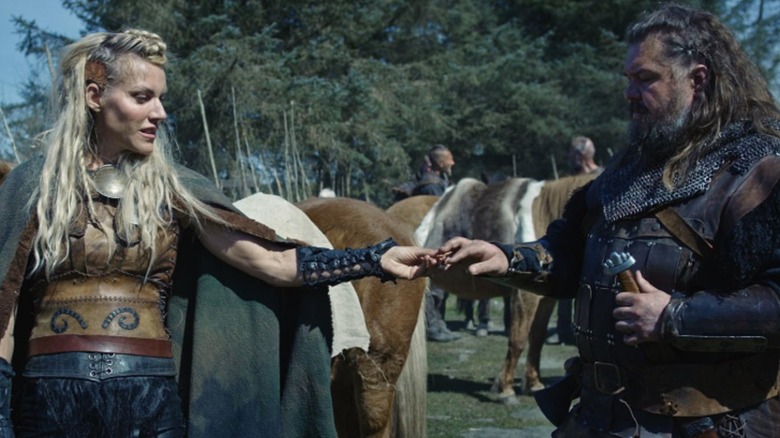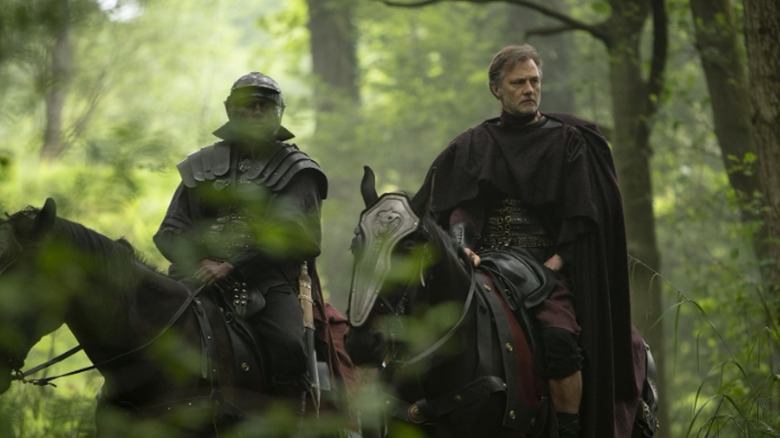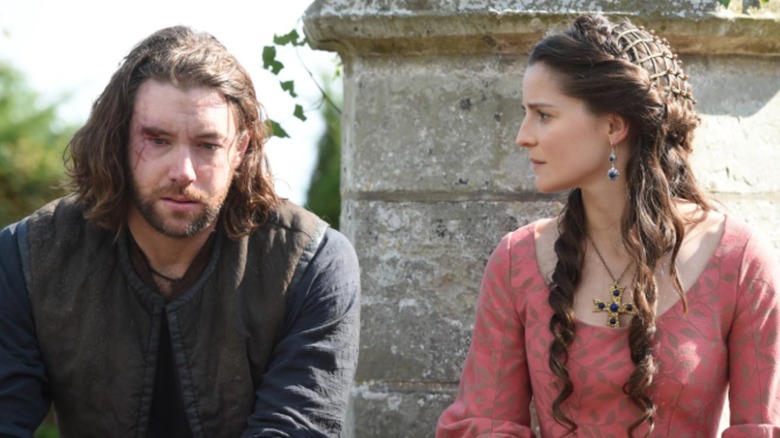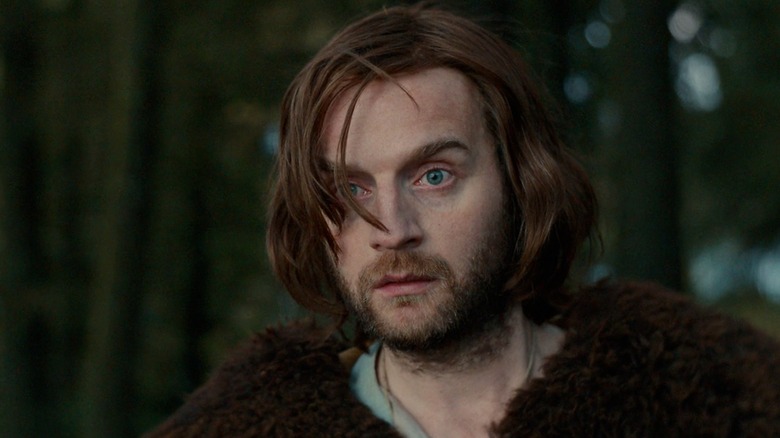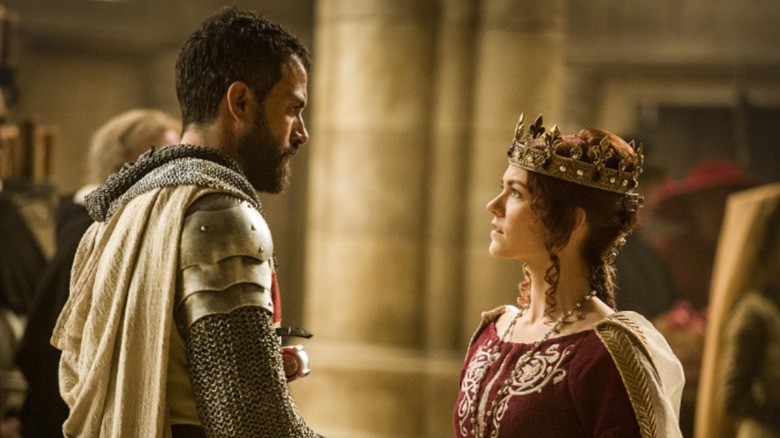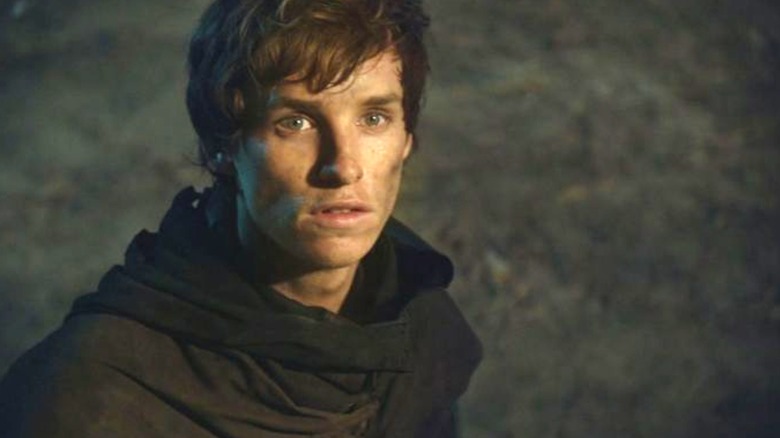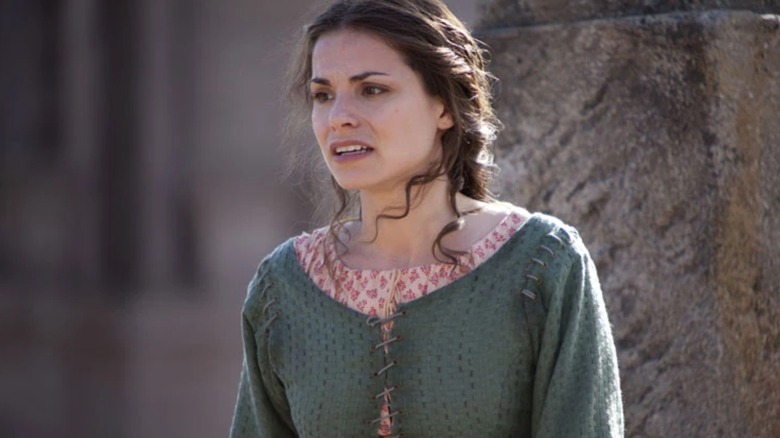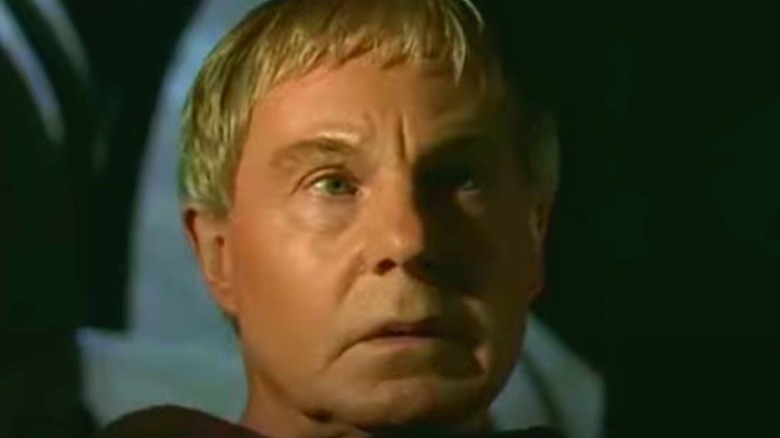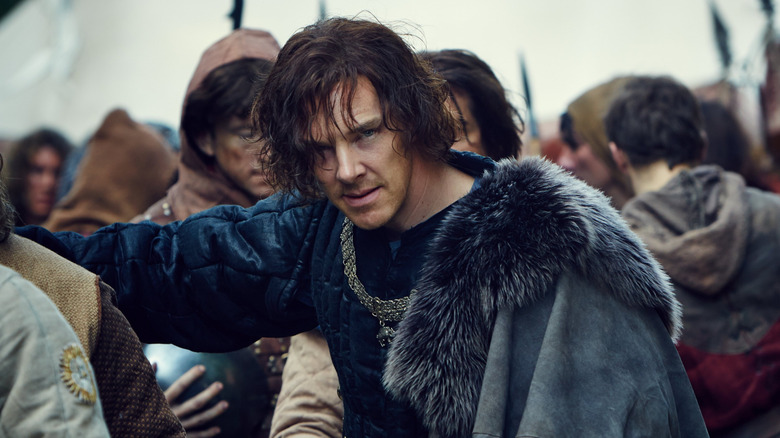12 Best Shows Like Vikings
Of all the eras to get lost in by way of historical drama, there's something wonderfully feral and gritty about the centuries sandwiched between the orderliness of the Roman republic and all the pomp and circumstance — not to mention the sumptuous costumes — of the Renaissance period. Full of swords, longboats, and sweaty Vikings, History's "Vikings" delivers violent medieval fun in droves.
As legendary figure Ragnar Lothbrok and his fellow Norsemen leave a world of ancient gods and Viking seer prophecies to fight for pieces of England and find a sneaky side door into Paris, it's a wild time from North Sea to snake pit. And the good news is that when it's over, there are plenty of great shows to fill the void — in a few different genres, no less. From the Shakespearean drama of "The Hollow Crown" to the much less sober take on Viking life depicted in "Norsemen," the best sword-filled historical dramas are dangerous, dark, and at times, downright dastardly.
The Last Kingdom
Before Britain became the country of "the sun never sets on the English empire" fame, it spent a few hundred years or so as a patchwork of various small kingdoms that were frequently at odds with each other — a situationship called the Heptarchy. And like most situationships, this was a particularly messy one. It's in this world that "The Last Kingdom" is set.
A gorgeous historical drama based on historical novelist Bernard Cornwell's "The Saxon Stories" series, "The Last Kingdom" falls between 866 and 878, around the same time frame Ragnar's story takes place, when The Great Heathen Army is making its way across the North Sea and through England. In fact, many of the same characters — real historical figures depicted in the same works that shared the legends of Ragnar and his sons — show up in this series.
The story follows the saga of the fictional Uhtred of Bebbanburg (Alexander Dreymon), an orphaned Saxon noble who ends up raised by Danes and grows up to reclaim his birthright amid a turbulent and wartorn England. Shaped by both his Danish and Saxon heritages, Uhtred makes a compelling and complex character. Once you're finished with the entire five-season series, be sure to watch the follow-up film, "The Last Kingdom: Seven Kings Must Die."
Vikings: Valhalla
If you're one of those "Vikings" fans who liked the show better with Ragnar and spent the last couple of seasons hoping he would pop up from behind a longboat declaring the whole snake pit scene was just a hilarious prank, don't let the lack of Ragnar stop you from watching this great sequel series. Just as "Vikings" deals with the legendary stories outlined in the Norse Sagas and Gesta Danorum, "Vikings: Valhalla" takes on another set of legendary figures set in a slightly later period, Freydís Eiríksdóttir (Alicia Agneson) and Leif Erikson (Sam Corlett), the real historical Norseman who was believed to have sailed to North America.
Set around 100 years after Ragnar's exploits, "Vikings: Valhalla" follows the Icelandic sibs as they leave their island to set sail for Kattegat. They soon find themselves in a world where King Æthelred II has turned on the Danes of England and the old Viking faith is being systematically stamped out either by conversion or at the tip of a sword. Split between the adventures of Freydis and Leif, the series follows Freydis as she sets out to be the last Viking leader to preserve the old ways and Leif as he journeys across Europe to the Mediterranean and eventually across the icy water to America.
Norsemen
A Norwegian production called "Vikingane" in its original tongue, "Norsemen" is to "Vikings" what "Z Nation" is to "The Walking Dead" — a funnier take that's actually good enough to watch on its own dramatic merits despite the comedy angle. Fantastic costumes, surprisingly well-choreographed fight scenes, clever writing, and excellent acting elevate the material The Guardian's Julia Raeside called "Monty Python meets Game of Thrones" and one Google reviewer compared to an "arranged marriage between Monty Python and Vikings." And unlike many of the best non-English productions, viewers don't have to choose between reading subtitles or watching a weird overdub, since "Norsemen" was filmed twice during production, once in Norwegian and once in English.
Set in late 8th-century Norway in the fictional village of Norheim, the half-hour historical sitcom follows the Viking warriors, chieftains, and villagers as they wrestle with problems both mundane and global that will often feel uncomfortably familiar to the modern viewer. It's a good series for fans of irreverent takes on history like "Our Flag Means Death" without sacrificing everything that makes "Vikings" fun to watch, replacing grisly violence with slightly more cartoonish violence and gently — and often anachronistically — poking fun at the myths and legends surrounding Viking lore.
Barbarians
Set in the 1st century A.D. in the peak of Rome's imperial era, "Barbarians" looks at Germanic corners of the Roman empire, a world where the Romans kept the local tribes — aka barbarians — on a tight leash. Life under Roman rule is hard and oppressive, but the warring Germanic tribes are too much at odds to launch any cohesive effort to overthrow them. What they need is a hero — and that's exactly what they get in Arminius (Laurence Rupp).
Following a similar plot to "The Last Kingdom," Arminius was born a member of the Germanic Cherusci tribe but came to live among the Romans after he and his brother Flavus (Daniel Donskoy) were offered as hostages as a means of guaranteeing peace between the Cherusci and the Romans. Raised in the Roman ways, Arminius grows up to become a Roman soldier. But upon his return to Germania with the Roman army, he returns to the Cherusci to take his rightful place as chieftain, ultimately uniting the tribes against Rome in the Varian Disaster, a real-world battle that proved devastating for the Romans.
The series presents an interpretation of those events, and most of its characters are based on real historical figures. Overall, the German-language series is much more historically accurate than many shows in its genre, presenting a Germanic perspective on an epoch that's usually told from the Roman angle.
Britannia
In a similar vein to "Barbarians," "Britannia" looks at the Romans' occupation of Britain from the point-of-view of the occupied tribes. Set in 43 A.D. nearly a century after Julius Caesar's failed occupation of the region, "Britannia" follows members of the feuding pagan Cantii and Regni tribes as they contend with the Roman invasion. Unlike "Barbarians," "Britannia" doesn't strive for historical accuracy, instead choosing to focus on the spirit and experience of the tribes under Roman occupation. Like "Vikings," the series exists in a world laced with fantasy elements, particularly through the Druids' visions and the presence of a demon. But those fantasy elements are what drives the plot — think "Vikings" but all Seer-driven drama.
"Britannia" stars David Morrissey, who played the Governor on "The Walking Dead," as Aulus Plautius, the real-world historical figure behind the Roman occupation of Britain. The female-driven story follows several members of the Cantii, including princess Kerra (Kelly Reilly) and Cait (Eleanor Worthington Cox) as they try to sort between prophecy and destiny to determine the future of their tribe.
The Bastard Executioner
Set your expectations for "The Bastard Executioner" knowing that it's an FX drama, and you're sure to have a good time on your one-season binge of this medieval bloodbath. The series, which takes place in 14th century Wales, revolves around its eponymous executioner, a once-peaceful Welsh farmer named Wilkin Brattle (Lee Jones). Brattle's tragic life of betrayal and unfathomable loss lead to his adoption of the nom de guerre Gawain Maddox, an alias taken from a journeyman executioner that becomes his living prison.
The short-lived series has a familiar cast that includes Matthew Rhys of "Perry Mason" and "The Americans," Stephen Moyer of "True Blood," and Katey Sagal, best known for her work on "Sons of Anarchy," "Futurama," and "Married ... With Children." Even Ed Sheeran makes an appearance.
While a complete work of fiction, the series references the real events of a 13th-century Welsh revolt. And at the end of the day, it's pretty good escapism for those of us who love the guilty pleasure of some gnarly medieval warfare.
The Winter King
Another great series based on Barnard Cornwell's work — this time the "Warlord Chronicles" novel series — "The Winter King" imagines the legendary events portrayed in Arthurian legend as historical events in the same way "Vikings" brings Ragnar Lothbrok's legendary exploits to life. Set in the Dark Ages after Rome's abandonment of her northern provinces, "The Winter King" follows Arthur Pendragon (Iain De Caestecker), the banished son of King Uther, as he becomes the warrior king he was meant to be for his people.
The series does a good job of presenting the chaos and uncertainty of a Britain when warring factions ruled the land and the people were torn between ancient superstitions and a dominant faith. The characters are captivating, and the story is steeped in fantasy and Dark Ages escapism that's much more fun to watch than it is historically accurate. And with only a season to binge before the show was cancelled, you don't have to stick around long enough to see Arthur become the bad guy.
Knightfall
The idea that the Knights Templar — the order of medieval knights charged with protecting visitors to the Holy Land — were obsessed with protecting the Holy Grail is a semi-modern pseudo-historical myth that's been the subject of many pop culture depictions from "Indiana Jones and the Last Crusade" to "The Da Vinci Code." So the fact that this is a major plot point for the History series "Knightfall," which aims to depict the rise and fall of the Templars, should give a sense of just how much historical accuracy to expect from this drama. But then again, we're not here for a history lesson — we're here for the swords, the armor, the medieval politics and intrigue, and most importantly, the Mark Hamill of it all.
Set in the Holy Wars, "Knightfall" follows Templar Landry de Lauzon (Tom Cullen), a noble knight who sets out to find the Holy Grail amid the waning years of the Knights' post-Crusades popularity. Throw in plenty of political dirty dealings and a fair amount of steamy forbidden romance, and "Knightfall" makes for some pretty spicy Middle Ages escapism.
The Pillars of the Earth
An eight-episode Starz miniseries adapted from a novel by Welsh historical writer Ken Follett, "The Pillars of the Earth" tells the story of the Anarchy, a period of English civil war that took place over 15 years in the mid-12th century, from the perspective of a community mid-cathedral build. And it's not just any cathedral — it's the type of generationally massive Gothic cathedral that could take medieval builders a century or longer to build.
Set in the fictional town of Kingsbridge, "The Pillars of the Earth" follows the lives of the people behind the grand project, namely Bishop of Kingsbridge Waleran Bigod (Ian McShane), Master Builder Tom Builder (Rufus Sewell), Prior Philip (Matthew Macfadyen), and Third Builder Jack Jackson (Eddie Redmayne). Helmed by its prestigious cast, the series deals with the complex politics intertwined in the lives of the community and the many challenges faced by the cathedral's builders taking on such a gargantuan project amidst the turmoil of a civil war.
World Without End
Set in the 14th century 150 years after "The Pillars of the Earth," "World Without End" revisits the Kingsbridge community just in time to find the descendants of its cathedral builders dealing with a handful of medieval worst-case scenarios in the form of the Black Plague, the Hundred Years' War, and a disastrous bridge collapse with a high body count. More illicit sex and political machinations feature heavily into the storytelling, but with some witchcraft accusations and a healthcare crisis thrown in along the way.
While the cast isn't quite as prestigious as the ensemble of the earlier series, it does feature a few recognizable faces including Cynthia Nixon and Tatiana Maslany, who plays a nun who falls in love with a woman. Like "The Pillars of the Earth," "World Without End" follows its sprawling cast, particularly focusing on the life of Caris (Charlotte Riley), a healer who enforces new hygiene restrictions during the plague outbreak and goes on to become the village Prioress. One thing this series does well is to present the delicate political dance of women living in these times to contribute meaningfully to their communities without ruffling any feathers and hastening their own demise.
Cadfael
In a list of historical series full of graphic medieval warfare and some pretty adult sex scenes, "Cadfael" is a show the whole family can enjoy — one that offers medieval escapism wrapped up in a gumshoe mystery. Set in 12th century England, the 1990s British mystery series follows the investigations of Brother Cadfael (Derek Jacobi), a monk living at the Benedictine Abbey in Shrewsbury. Cadfael is a different kind of monk. While most take their vows in their youth, Cadfael spent his life seeing the world as a crusader before joining the order in his forties. Those experiences in the Holy Land and on the road left him with a keen eye for detail and a wealth of knowledge that comes in handy whenever there's a mystery afoot — something that tends to happen quite often in his neck of the woods.
Jacobi's acting and the formulaic mysteries make for a satisfying watch in a series that reminds viewers medieval dramas can do more than just focus on forbidden affairs that end in disaster. It's also a surprisingly well-researched series in terms of historical accuracy.
The Hollow Crown
Technically a series of full-length film adaptations, "The Hollow Crown" is a British show where each entry is an adaptation of William Shakespeare's plays about power and politics. And it's positively stacked with prestigious actors from top to bottom.
The series presents an adaptation of the so-called Henriad, Shakespeare's history plays about the rise of British monarchs culminating during the Wars of the Roses, a period of civil war that pitted the Yorks against the Lancasters in pursuit of the crown. The first film in the series, "Richard II," deals with the 14th-century plot to overthrow King Richard II of England (Ben Whishaw) and also stars Patrick Stewart and David Morrissey. The two "Henry IV" and "Henry V" plays follow, starring Jeremy Irons, Tom Hiddleston, and Paterson Joseph, and depicting the struggles Henry IV and his son face as they desperately cling to their hard-won power. And the final film stars Benedict Cumberbatch as the often-maligned King Richard III of "My kingdom for a horse!" fame.
Since many of the characters in these plays overlap, "The Hollow Crown" puts them all together in a beautifully produced epic saga of Machiavellianism and the emptiness of the endless thirst for power that preoccupied Shakespeare's histories — not to mention England's. These are some of the best movie adaptations of Shakespeare out there, and they're every bit as compelling as any episode in the "Vikings" timeline.
